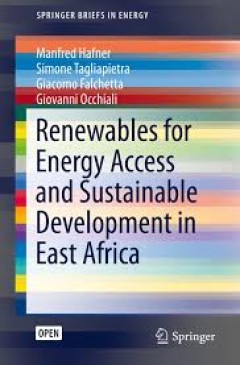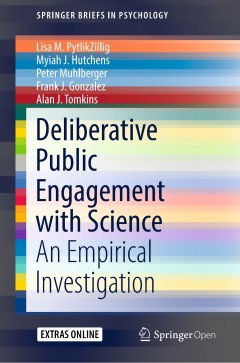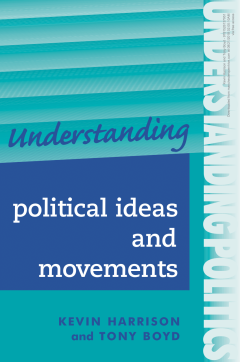Filter by

Australian politics in a digital age
Information and communications technologies are increasingly important in the Australian political landscape. From the adoption of new forms of electoral campaigning to the use of networking technology to organise social movements, media technology has the potential to radically change the way politics is conducted and experienced in this country. The first comprehensive volume on the impact of…
- Edition
- -
- ISBN/ISSN
- 9781922144409
- Collation
- xviii, 268 p.
- Series Title
- -
- Call Number
- 303.48330994 PET a

Renewables for energy access and sustainable development in east Africa
This short open access book investigates the role of renewable energy in East Africa to provide policy-relevant inputs for the achievement of a cost-effective electrification process in the region. For each country, the authors review the current situation in the domestic power sector, adopt a GIS-based approach to plot renewable energy resources potential, and review currently planned projects…
- Edition
- -
- ISBN/ISSN
- 9783030117351
- Collation
- 149 hlm
- Series Title
- -
- Call Number
- 330 HAF r

Where truth lies : digital culture and documentary media after 9/11
"This boldly original book traces the evolution of documentary film and photography as they migrated onto digital platforms during the first decades of the twenty-first century. Kris Fallon examines the emergence of several key media forms—social networking and crowdsourcing, video games and virtual environments, big data and data visualization—and demonstrates the formative influence of po…
- Edition
- -
- ISBN/ISSN
- 9780520972117
- Collation
- XVI, 228 p.
- Series Title
- -
- Call Number
- 302.2310973 FAL w

Political responsibility for a globalised world: after levinas' humanism
The aim of this book is to reflect on the complex practice of responsibility within the context of a globalised world and contemporary means of action. Levinas' exploration of the ethical serves as point of entry and is shown to be seeking inter-cultural political relevance through engagement with the issues of postcoloniality and humanism. Yet, Levinas fails to realise the ethical implications…
- Edition
- -
- ISBN/ISSN
- 9783839416945
- Collation
- 283 p.
- Series Title
- -
- Call Number
- 320.01 WOL p

The cinema of Oliver Stone: art, authorship and activism
This book charts and analyses the work of Oliver Stone – arguably one of the foremost political filmmakers in Hollywood during the last thirty years. Drawing on previously unseen production files from Oliver Stone’s personal archives and hours of interviews both with Stone and a range of present and former associates within the industry, the book employs a thematic structure to explore Ston…
- Edition
- -
- ISBN/ISSN
- 9780719099168
- Collation
- viii, 304 pages : ill ; 23 cm
- Series Title
- -
- Call Number
- 791.430233092 CIN c

Atlas of challenges and opportunities in European neighbourhoods : stemming f…
This atlas provides a macro-regional overview of the areas that surround the European Union, from the Sahara to the Middle East, Western Balkans to European Russia, Turkey to the Arctic. Detailing key socio-economic data as well as developmental trends, the maps provide a comprehensive territorial analysis at a local scale and explore the potential for regional integration and cooperation. Thes…
- Edition
- -
- ISBN/ISSN
- 9783319285214
- Collation
- xxiii, 198p. : ill.
- Series Title
- -
- Call Number
- 304.2 ATL a

Deliberative public engagement with science : an empirical investigation
This compact open access reference delves beyond popular concepts of educated consumers and an informed public by examining the science behind deliberative engagement. Using data from four longitudinal studies, the authors assess public engagement methods in deliberative discussions of ethical, legal, and social issues concerning innovations in nanotechnology. Coverage includes the theoretical …
- Edition
- -
- ISBN/ISSN
- 9783319781600
- Collation
- xi, 129p. : ill.
- Series Title
- -
- Call Number
- 155.2 PYT d

Socialism, capitalism and alternatives: area studies and global theories
In 1989 the Berlin Wall came down. Two years later the Soviet Union disintegrated. The collapse of communism in Eastern Europe and the Soviet Union discredited the idea of socialism for generations to come. It was seen as representing the final and irreversible victory of capitalism. This triumphal dominance was barely challenged until the 2008 financial crisis threw the Western world into a st…
- Edition
- -
- ISBN/ISSN
- 9781787353824
- Collation
- xvii, 234 p. :
- Series Title
- -
- Call Number
- 330.9 SOC s

Understanding political ideas and movements
Written specifically to cover the A2 component of the GCE Government and Politics A-level, this book is a comprehensive introduction to the political ideas and movements that have shaped the modern world. Underpinned by the work of major thinkers such as Hobbes, Locke, Marx, Mill, Weber and others, the first half of the book looks at political concepts including the state and sovereignty, the n…
- Edition
- -
- ISBN/ISSN
- 0719061512
- Collation
- 360 p. : ill. ; 24 cm.
- Series Title
- Understanding politics
- Call Number
- 320.5 HAR u

Security and privacy
This study is principally concerned with the ethical dimensions of identity management technology – electronic surveillance, the mining of personal data, and profiling – in the context of transnational crime and global terrorism. The ethical challenge at the heart of this study is to establish an acceptable and sustainable equilibrium between two central moral values in contemporary liberal…
- Edition
- -
- ISBN/ISSN
- 9781921862571
- Collation
- -
- Series Title
- -
- Call Number
- 363.325 MAM s
 Computer Science, Information & General Works
Computer Science, Information & General Works  Philosophy & Psychology
Philosophy & Psychology  Religion
Religion  Social Sciences
Social Sciences  Language
Language  Pure Science
Pure Science  Applied Sciences
Applied Sciences  Art & Recreation
Art & Recreation  Literature
Literature  History & Geography
History & Geography